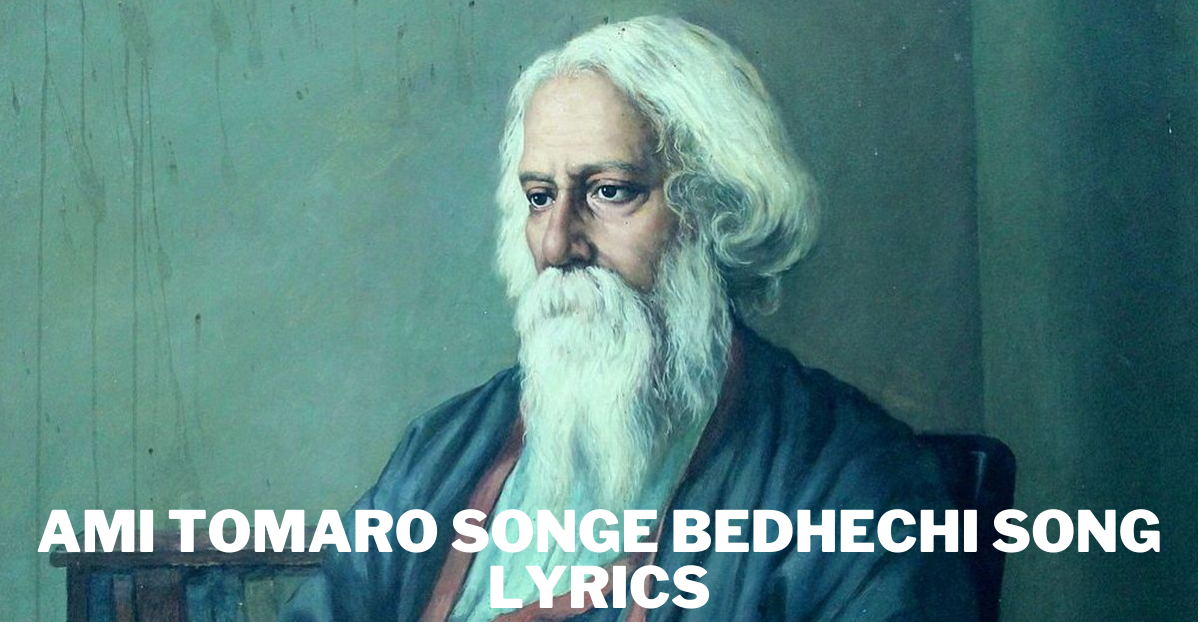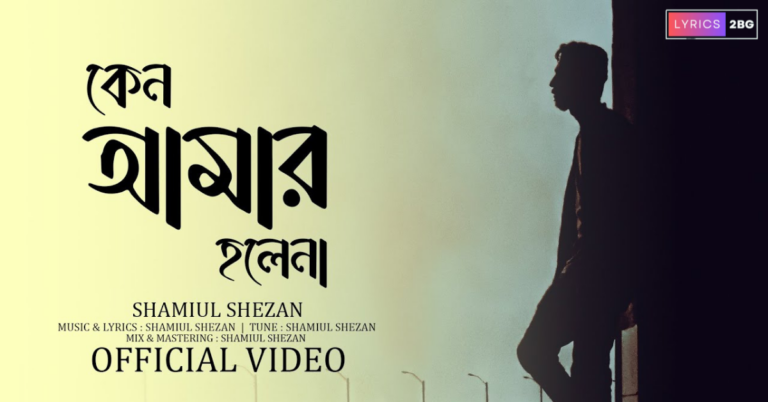Ami Tomaro Songe Bedhechi Amaro Pran Lyrics | আমি তোমার সঙ্গে বেঁধেছি | Rabindra Sangeet
Ami Tomaro Songe Bedhechi Amaro Pran Lyrics
আমি তোমার সঙ্গে বেঁধেছি আমার প্রাণ
সুরের বাঁধনে,
তুমি জানো না, আমি তোমারে পেয়েছি
অজানা সাধনে,
আমি তোমার সঙ্গে বেঁধেছি আমার প্রাণ
সুরের বাঁধনে।
সে সাধনায় মিশিয়া যায় বকুলগন্ধ
সে সাধনায় মিলিয়া যায় কবির ছন্দ,
তুমি জানো না,
ঢেকে রেখেছি তোমার নাম
রঙ্গীন ছায়ার আচ্ছাদনে,
আমি তোমার সঙ্গে বেঁধেছি আমার প্রাণ
সুরের বাঁধনে।
তোমার অরূপ মূর্তিখানি
ফাল্গুনের আলোতে বসাই আনি,
অরূপ মূর্তিখানি
বাঁশরি বাজাই ললিত-বসন্তে, সুদূর দিগন্তে
বাঁশরি বাজাই ললিত-বসন্তে, সুদূর দিগন্তে,
সোনার আভায় কাঁপে তব উত্তরী
সোনার আভায় কাঁপে তব উত্তরী
গানের তানের সে উন্মাদনে,
তুমি জানো না, আমি তোমারে পেয়েছি
অজানা সাধনে,
আমি তোমার সঙ্গে বেঁধেছি আমার প্রাণ
সুরের বাঁধনে।
Meaning of Ami Tomaro Songe Bedhechi Amaro Pran Lyrics
Ami tomaro songe bedhechi amaro pran lyrics is essentially about the poet’s deep connection and devotion to a beloved, whom he considers to be his ultimate companion in life. Throughout the song, the poet expresses his unconditional love for this person and how he has bound himself to their company. Ami tomaro songe bedhechi amaro pran lyrics of the song are beautiful and poignant, expressing the depth of the poet’s emotions.
The poet speaks of how he has given himself entirely to his beloved and how their company brings him peace and joy. He compares their bond to that of a bird and a tree, saying that just as a bird finds its home in the tree, he has found his home in the company of his beloved. The poet also expresses his gratitude for having found such a wonderful companion in life. He says that the love he shares with his beloved is like a beautiful flower that has bloomed in his heart, filling him with happiness and contentment.

Ami tomaro songe bedhechi amaro pran lyrics is often interpreted as a metaphor for the human connection to the divine. In this interpretation, the beloved is seen as a representation of the divine, and the speaker is describing their deep connection to a higher power. The song speaks to the idea that when we connect with something greater than ourselves, we become bound to it, and it becomes a part of who we are.
In the song, the speaker describes how they have bound themselves to their beloved. They speak of how they have shared all of their joys and sorrows with their beloved, and how they have surrendered themselves completely to their love. The speaker goes on to describe how their beloved has become an integral part of their very being, and how they cannot imagine life without them.
About the Author of the Song
“Ami Tomaro Songe Bedhechi amaro pran” is a Bengali song that is often attributed to the legendary Indian poet, musician, and philosopher Rabindranath Tagore. The title roughly translates to “I Have Bound Myself With You,” and the song speaks to the idea of being deeply connected to someone or something.
Rabindra Sangeet “Ami Tomaro Songe Bedhechi Amaro Pran Lyrics” sung by Raj Burman From the Bengali film Mayajaaler Khela, starring Abhishek Chatterjee and Indrani Haldar, the same song is sung by Indrani Sen, Jayati Chakraborty, Srikanto Acharya, Shaan, Kavita Krishnamurthy, Trissha Chatterjee, and Manomoy Bhattacharya. Rabindranath Tagore composed the lyrics for the song “Ami Tomar Songe Bedhechi Amar Praan.”
Overall, “Ami Tomaro Songe Bedhechi amaro pran” is a beautiful love song that celebrates the beauty and depth of human emotions. It speaks of the unbreakable bond between two people who are deeply in love and how their love can bring peace and happiness to their lives.
Song – Ami tomaro songe bedhechi amaro pran lyrics
Singer – Ikkshita Mukherjee
Tune and lyrics – Rabindranath Tagore
Rearranged and design – Amit & Ishan
Mixing and Mastering- Amit Chatterjee
Cast – Sohini Sarkar, Rajnandini Paul, Anubhav Kanjilal, Prantik Banerjee, Laboni Sarkar, Rajat Ganguly, and Parometa Mukherjee.
Director – Sayantan Ghosal
Production – Follow Focus







